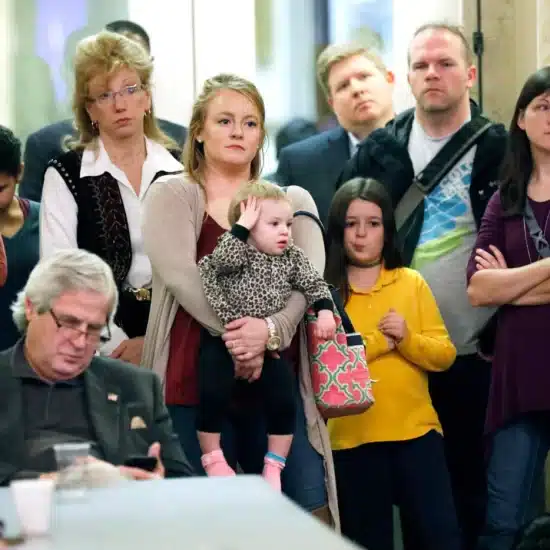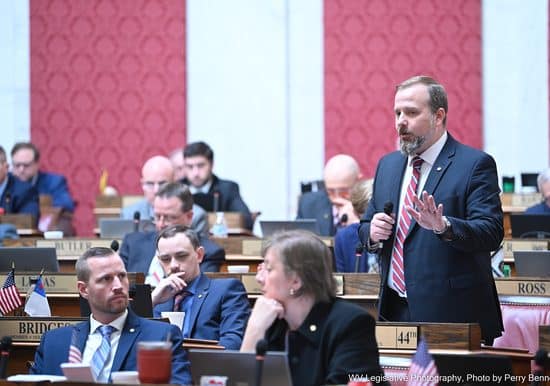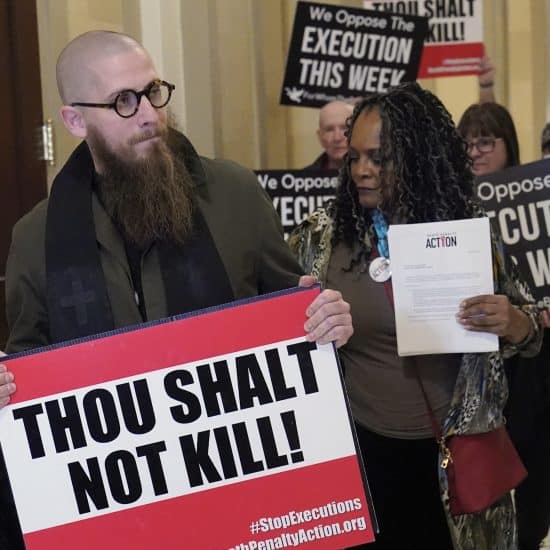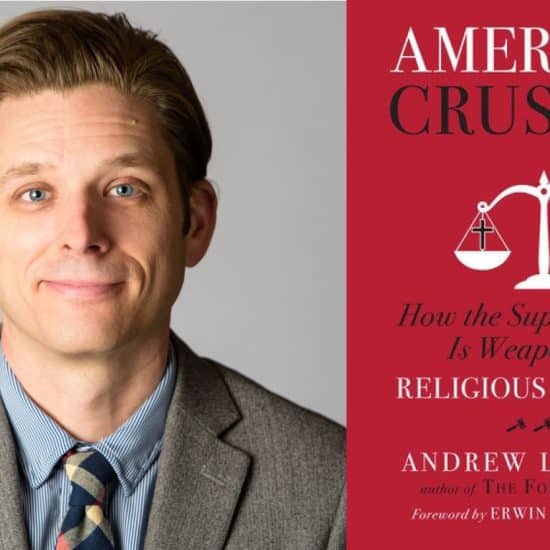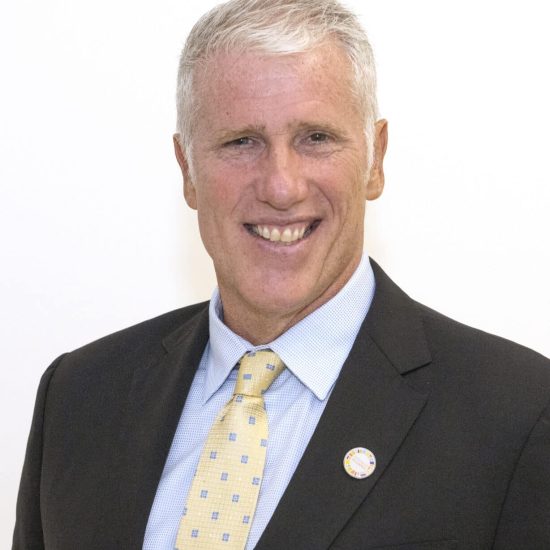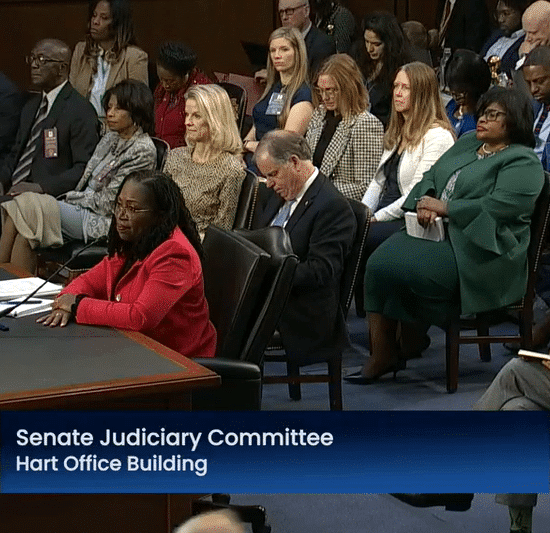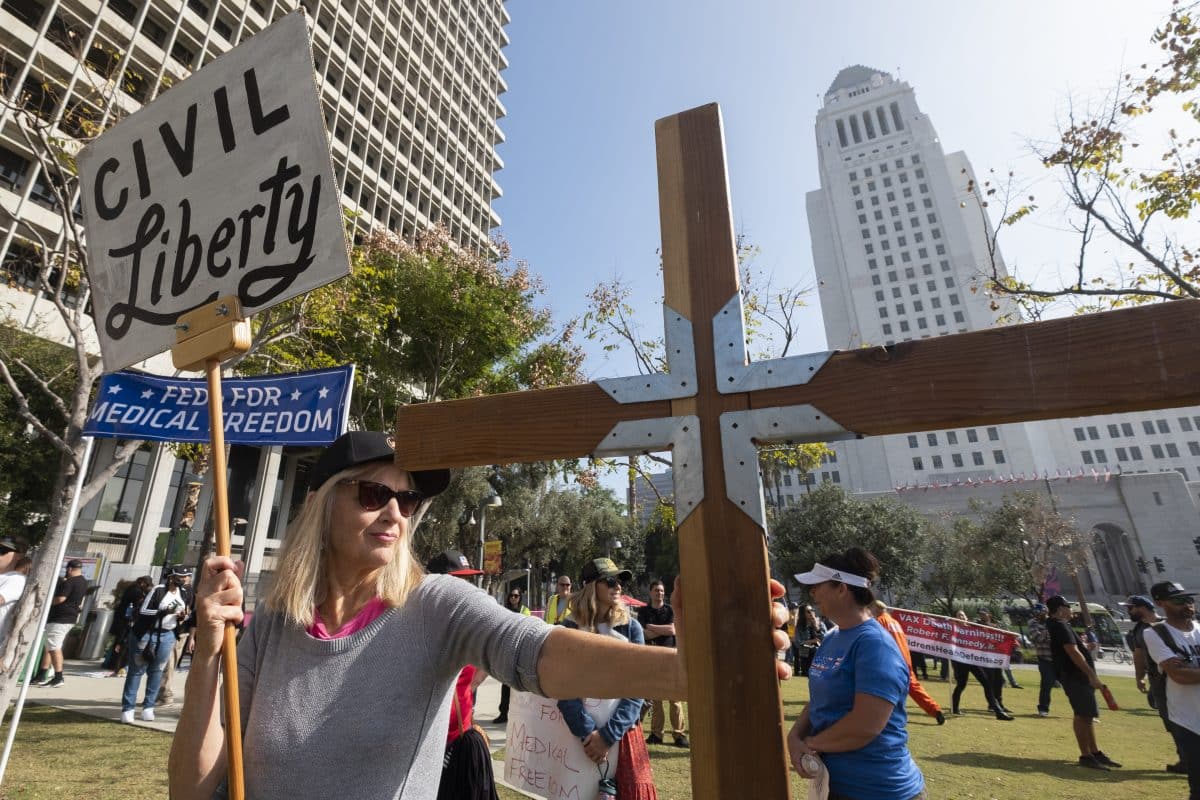
Rev. Jackson Lahmeyer wants to help you get a religious exemption from a COVID-19 vaccine mandate. It’s as simple as 1-2-3. First, follow his Sheridan Church on social media. Second, make a donation to his Tulsa, Oklahoma, congregation. Third, download his “religious exemption” form. And he’s quick to point out that you can’t skip step two.
The charismatic pastor, who is challenging U.S. Sen. James Lankford in next year’s Republican primary, has refused to get vaccinated, got COVID, and promotes remedies that don’t actually work, like taking the parasitic medication ivermectin. While about 300 people attend the church, tens of thousands have downloaded the form (which suggests we’ve really missed out on a great fundraising opportunity here at Word&Way).
But if convictions are sincere, one doesn’t actually need a pastoral form to assert a religious exemption against a government rule. Thus, Charles Haynes, senior fellow for religious freedom at the Freedom Forum in Washington, D.C., told the Washington Post that Lahmeyer’s effort is really more like televangelists selling prayer cloths or other trinkets.
“He’s not really selling a religious exemption,” explained Haynes. “He’s selling a bogus idea that you need one.”
Yet, other pastors have joined the exemption racket. For instance, a California pastor we wrote about during the gubernatorial recall election put out his own “religious exemption” form. If you want more specialized assistance, Rev. David and Peggy Hall offer tiered packages to give you “expert help with your religious exemption” that will “save your job, your freedom, your dignity — and your soul!” Ranging from the $175 “concierge program” all the way up to the $495 “VIP package,” they promise to give you a signed form, research and other documents, and — if you opt for the higher package — a personal phone call with the couple.
Those getting into this anti-vax “side hustle” extend beyond provocative pastors to include political groups like the legal advocacy nonprofit of former Trump lawyer Sidney Powell. Money, apparently, is a more powerful drug than a vaccine.
With the details of the Biden administration’s vaccination rules for employers rolling out last week, legal challenges to vaccine requirements are quickly increasing. In this issue of A Public Witness, we roll up our sleeves to examine prominent Christian leaders challenging vaccination mandates. And we warn of the danger of an underlying spiritual-but-not-religious individualism infecting our society.
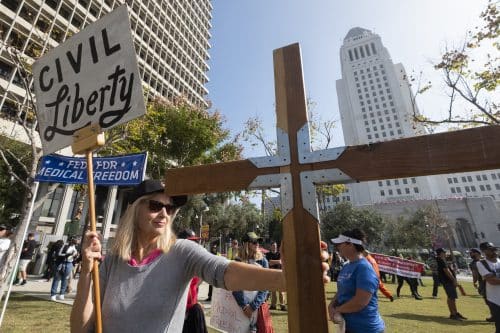
An anti-vaccination protest in Los Angeles, California, on Nov. 8, 2021. (Ringo Chiu via AP)
Help, I’m Being Repressed
On Friday (Nov. 5), the largest Baptist seminary and the largest Methodist seminary in the country filed a joint lawsuit against the new Biden vaccine rules for employers. With more than 100 employees, both Southern Baptist Theological Seminary and Asbury Theological Seminary fall under the requirement that employees either get vaccinated or undergo weekly COVID testing.
Ryan Bangert, senior counsel for the Alliance Defending Freedom that helped filed the suit on behalf of the seminaries, argued that the Biden administration is wrong to “treat unvaccinated employees like workplace hazards or to compel employers to become vaccine commissars.” He downplayed the threat that coworkers pose to each other even though, cough, a significant number of COVID transmissions have occurred in workplaces.
Bangert also claimed the Biden rules would force “employers like our clients to intrude on their employees’ personal health decisions.” That argument comes with a dose of irony, since ADF literally served as one of the legal teams in the U.S. Supreme Court Case’s so-called “Hobby Lobby” case in which ADF argued that its client, Conestoga Wood Specialties (and other companies like Hobby Lobby), should be allowed to enact their own religious beliefs in ways that, well, “intrude on their employees’ personal health decisions.”
Adding to the confusion was SBTS President Albert Mohler struggling to articulate a clear understanding of the Biden Administration’s requirements or the argument decrying the lack of religious exemptions.
In announcing the lawsuit, Mohler repeatedly complained about “government coercion” and “the coercive power of the state.” Of course, he regularly defends the use of capital punishment, the most coercive power the government exerts. Both the comments from Mohler and Bangert could be cynically interpreted through the lens of politics. Government power is justified when serving my ends and illegitimate when requiring actions with which I disagree.
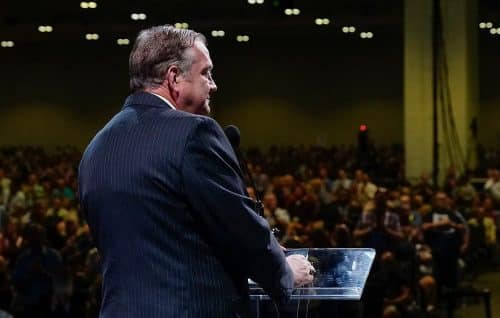
Albert Mohler, president of Southern Baptist Theological Seminary, gives a report during the Southern Baptist Convention annual meeting in Nashville, Tennessee, on June 16, 2021. (Abbey Sprinkle/Baptist Press)
Mohler continued his litany of complaints in asserting the new rules would require institutions to “interrogate its employees” and “puts those institutions in the position of violating conscience” of their employees. Such objections are hard to take seriously given Mohler’s own history of institutional leadership. Consider that he forced out a theology professor because she was a woman. He canceled a hire of a faculty member whose conscience believed women could be ministers. He shuttered the whole social work program because he disagreed with the professors and the nature of the discipline. And he banned professors from teaching critical race theory or intersectionality — even though Southern Baptists (who in Baptist polity are in charge) had previously affirmed some use of both CRT and intersectionality. For Mohler, conscience appears to matter only when convenient.
The Southern Baptists are a decentralized denomination. Given the chance to name Mohler as their leader, they overwhelmingly declined and no election audit has yet to cast doubt on the results. But they do speak as a denomination to draw clear doctrinal lines. They have not, however, articulated an anti-vax or anti-mandate position during this pandemic or in times past — a fact Mohler acknowledged last Friday. In fact, the international missionary arm of Southern Baptists even imposed a COVID vaccine mandate on its missionaries and their families. Whatever the roots of Mohler’s opposition to the vaccine mandate, he’s offered no evidence grounding it in a sincerely-held religious belief as articulated by his denomination or theological institution.
Douglas Laycock, a law professor at the University of Virginia with an expertise in religious liberty and experience arguing related cases before the U.S. Supreme Court, explained: Religious exemptions don’t apply when “the objectors really do object to vaccination, but their reasons are not religious.” He added that given the opposition to COVID vaccination as an identity marker for the political right, it “could mean a flood of false religious claims” and court rejections of such exemption requests.
Simply put, political opposition is not the same as religious beliefs. Using the latter to advance the former mocks true claims of conscience.
Religious Exemption Revival
By definition, religious exemptions are rare. If lots of people opt out to a policy, it basically falls apart. But in this politicized pandemic earlier fueled by a former president who suggested bleach and magic light beams, cable news hosts inspiring people to visit the pharmacy aisle of their veterinarian, and social media algorithms promoting misinformation, many people are avoiding the very thing that could save their lives because of the political statement it sends.
But with few qualifying for a legitimate medical exemption, the only options for most people are to get jabbed or get “religion.” Across the nation, the numbers of people demanding a religious exemption almost seems like we’re in the midst of another great awakening. One would naturally suspect that churches are bursting with new converts.
The faithful include tens of thousands of federal employees and more than 10,000 (or about 9%) of Boeing employees. The U.S. Supreme Court last week rejected an emergency appeal from health care workers in Maine that a Christian legal group filed on behalf of 2,000 workers who don’t want to get vaccinated.
But the rise of religious exemptions threatens not only public health but the core ideas behind religious exemptions. Abuse undermines the logic of the entire principle. Lawmakers in Connecticut earlier this year voted to end religious exemptions as an option for childhood immunizations required for schools. An effort to remove religious exemptions for health care workers in New York is in legal limbo after some Catholic and Baptist medical workers sued to stop it. Once religious exemptions lose their meaning, more legislative and legal fights are sure to come that will further narrow the grounds for honest objections.

Demonstrators at Houston Methodist Baytown Hospital in Baytown, Texas, protest on June 7, 2021, against a policy that says hospital employees must get vaccinated against COVID-19 or lose their jobs. (Yi-Chin Lee/Houston Chronicle via AP)
Some companies are also pushing back against the influx of anti-vax adherents. After about 5% of the more than 1,800 employees in the Conway Regional Health System in Arkansas requested a religious exemption to its vaccine mandate, the hospital asked such individuals to fill out a “religious attestation form.” Since the religious argument levied against the COVID vaccines is usually around the use of fetal cell lines to test the vaccines, the hospital’s form notes common medications that similarly used fetal cell lines during development. If the staff wish to still request a religious exemption, they must sign the document to “truthfully acknowledge and affirm that my sincerely held religious belief is consistent and true and I do not use or will use any of the medications listed as examples or any other medication … that has used fetal cell lines in their development and/or testing.”
“We can’t have staff who claim a sincerely-held belief, but then don’t live by it in other aspects of their life,” explained Matt Troup, president and CEO of Conway Regional Health System.
So, what are the 30 common medications listed as also utilizing fetal cell lines in development? Just things like Aspirin, Benadryl, Claritin Ex-Lax, Ibuprofen, Lipitor, Motrin, Pepto-Bismol, Preparation H, Sudafed, Tums, Tylenol, and Zoloft.
Get cutting-edge analysis and commentary like this in your inbox every week by subscribing today!
A Church of One
Here’s a neglected fact in the debate over religious exemptions: most faith traditions either explicitly support vaccination or fail to raise any moral objection to it. Those trying to opt out on the basis of their convictions awkwardly find themselves at odds with the very religion they claim to sincerely believe in.
American Catholics are an obvious example. Back in January, Pope Francis stated his belief that “morally everyone must take the vaccine.” Many Catholic dioceses are following the Pope’s guidance and denying religious exemptions. Prominent Catholic ethicists publicly argue that the Church’s own moral framework does not allow for conscientious objection to the vaccine.
“Individuals who object to such a mandate and seek an exemption, due to moral qualms that have already been addressed by the church’s highest magisterial authorities, are exhibiting scrupulosity: the unreasonable fear that they are committing a sin when they are not,” wrote Jason Eberl of Saint Louis University. “While, according to Aquinas and as the church continues to teach, every individual should follow their conscience, even if their conscience is in error, doing so does not excuse one’s subsequent behavior if one’s conscience is misinformed by voluntary ignorance.”
Other U.S. religious groups — such as the Greek Orthodox Archdiocese in America, the Evangelical Lutheran Church in America, and the Church of Jesus Christ of Latter-day Saints — stated their opposition to offering religious exemptions to vaccine mandates by private employers or governments.
Our suspicion is that most people seeking religious exemptions are not actually aware of what their own denomination or tradition teaches on this issue. Even if they possessed such information, we doubt many would alter their own opinions if contradicted by church doctrine.
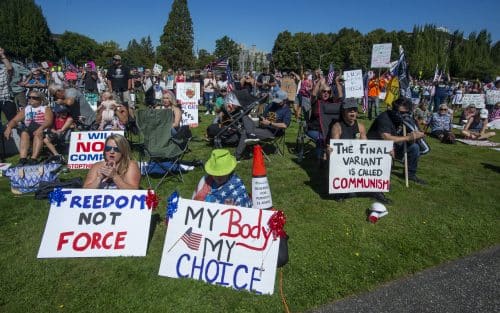
People gather outside the Washington State Capitol to protest Gov. Jay Inslee’s vaccine mandate for state workers on Aug. 28, 2021, in Olympia, Washington. (Drew Perine/News Tribune via AP)
Historically, there is evidence of abuse in the seeking of religious exemptions from vaccinations. Legal scholar Doris Rubenstein Reiss reports parents lying about their religious beliefs, claiming adherence to a tradition that is not actually their own, or even making up a fake religion to avoid school immunization requirements for their children.
All this harkens back to a classic text in the sociology of religion: Robert Bellah’s Habits of the Heart. This treatise on individualism, which is “the first language in which Americans tend to think about their lives” made “Sheilaism” famous.
“I believe in God. I’m not a religious fanatic. I can’t remember the last time I went to church. My faith has carried me a long way. It’s Sheilaism. Just my own little voice,” Bellah described a young nurse, named Sheila, as saying.
Such thinking, Bellah offered, reduces faith to an act of individual expression, with each person crafting a creed of their own. And when individuals do borrow or prooftext from the Bible to justify their own feelings, it doesn’t always work well.
Consider a woman at a rally in Alabama interviewed by a CNN reporter in August. Explaining that she got her news from “prophets of God and Newsmax and maybe a little Fox,” the anti-vaxxer explained her opposition because she was listening to God: “I think it is a time where God is separating the sheeps [sic] from the goats.” That allusion is, of course, to a famous parable of Jesus where the sheep are the righteous who helped “the least of these,” while the goats are selfish and are cast away in judgment. So, the CNN reporter asked the woman what should’ve been an easy follow-up: Which one is she?
“I am a goat, cause I ain’t a sheep. I’m not doing what they tell me to do. I’m fighting against it,” the woman responded in the words of her personal faith without any indication that she was, well, sheepish about it.
Traditional authority rooted in sacred scriptures, specially trained and anointed leaders, or the history and wisdom of a community are cast aside. All wisdom and obligation is rooted in one’s self. There is no accountability beyond one’s own conscience, which is formed eclectically based on personal preference. Each person is a religion unto themselves.
Sheilaism appears to be lurking beneath many of the debates about religious exemptions to vaccine mandates. Few are earnestly struggling with fidelity to a tradition. Instead, religion becomes the convenient excuse for realizing one’s own desires to not be immunized.
Help sustain the ministry of Word&Way by subscribing to A Public Witness!
Vaguely Spiritual, Not Sincerely Religious
Obviously, there’s no way for us to peer inside someone’s soul to know their true religious belief. While we strongly support getting vaccinated against COVID-19, we recognize (but do not understand) the opposition that exists. We are skeptical that much of the opposition is actually rooted in the convictions of faith. Our complaint is that using religion as a veneer to avoid vaccination mocks God and undermines legitimate claims of conscience.
As someone with the Southern Baptist Convention’s Ethics and Religious Liberty Commission told Ruth Graham of the New York Times: “If everything becomes a religious liberty issue, then nothing is.” We would suggest someone pass that wisdom over to Al Mohler.
Jesus invited his followers to “take my yoke upon you and learn from me” and said “Whoever wants to be my disciple must deny themselves and take up their cross and follow me.” Thus, being a Christian involves a type of humility and obedience. The idea of submission to an authority beyond ourselves gets a bad rap in our culture. Given the ongoing legacy within both church and society of power being abused, some of that reputation is tragically earned. In other ways, the resistance reflects the culmination of the individualism that Habits of the Heart first described over 25 years ago.
But this is not a debate about every authority in any place. It is the simple belief that following Jesus requires subsuming our wills to his purposes. In doing so, we believe that we are serving not ourselves but the Reign of God.

(William White/Unsplash)
Those of us still foolish enough to believe in denying ourselves to follow Christ, living under the authority of scripture, participating in Christian community, and deferring to the wisdom of this tradition even as we push for reforms and renewal, are often appalled by the rise of the “spiritual but not religious.” This crowd appears to turn religion into a Golden Corral, consuming what satisfies and leaving behind what they dislike. Everyone leaves full but nobody eats the same meal.
Mohler warned in August about the “spiritual-but-not-religious” mentality where because of a “recession of theology, there has been a resurgence of what is described as spirituality.” He added, “Fallen humanity wants to create a religion that is all about the guidelines that we would put on ourselves, the structures that we would invent for ourselves. If it’s a religion of me, well, set at it, your own rules, your own guidelines, your own doctrines.” To that we say “amen” and “call your office.”
Catholic priest and author James Martin explained it even better: “Being spiritual but not religious can lead to complacency and self-centeredness. If it’s just you and God in your room, and a religious community makes no demands on you, why help the poor?”
Martin’s logic fits this moment well. Lots of self-professed religious people are ignoring what the faith community almost universally teaches about vaccinations. They are using religion as a cover to avoid being immunized. In doing so, they are refusing to consider the implications of their actions on others.
Many of those applying for religious exemptions to the vaccine mandate are actually seeking to be exempted from religion. They cynically see it as a useful tool to accomplish their goals rather than a way of life that influences everything they do.
Instead of buying into this logic, Christian leaders should be pushing back. Otherwise, they aid and abet the spiritual-but-not-religious mindset that foolishly claims religion is all about what we want rather than being all about what God wants from us.
As a public witness,
Brian Kaylor & Beau Underwood

